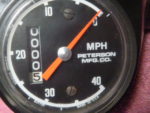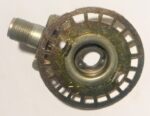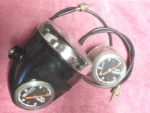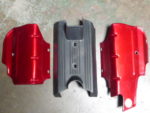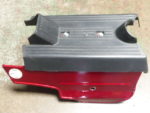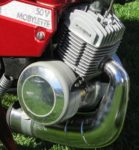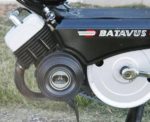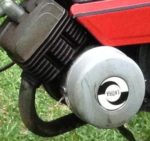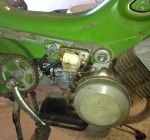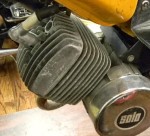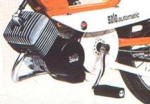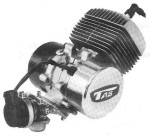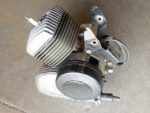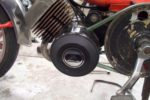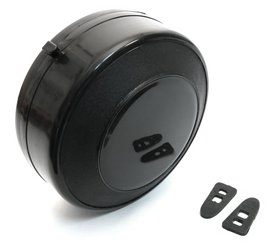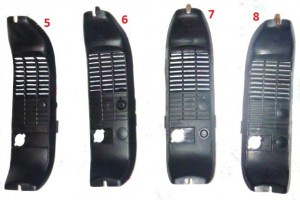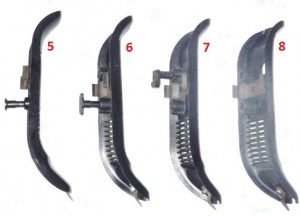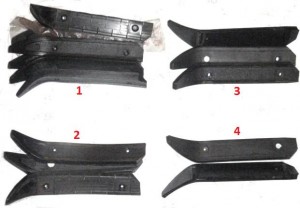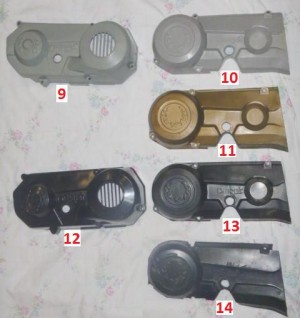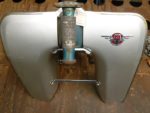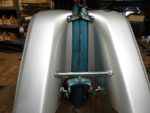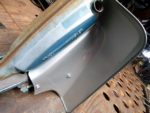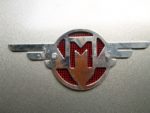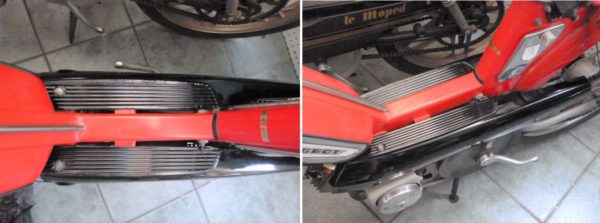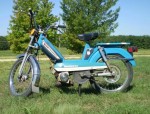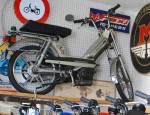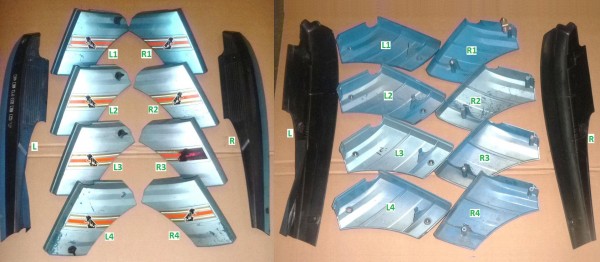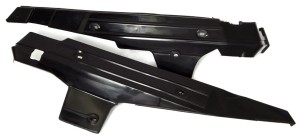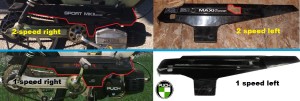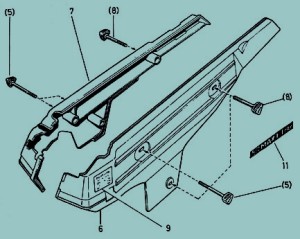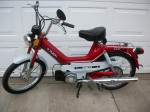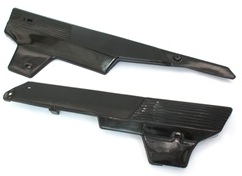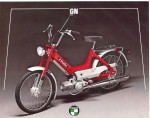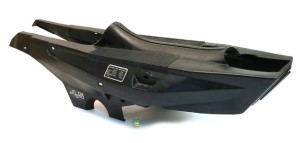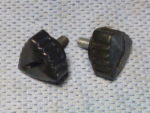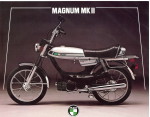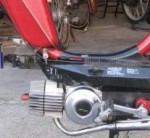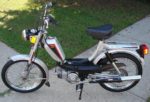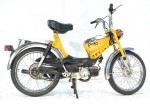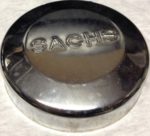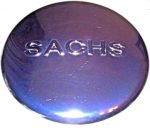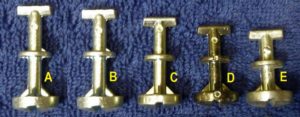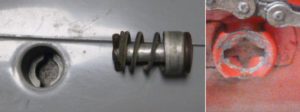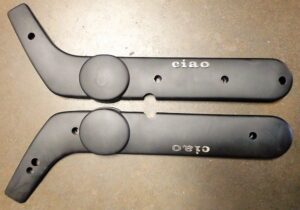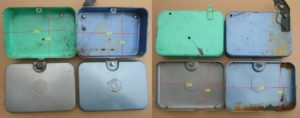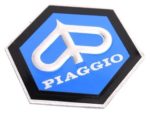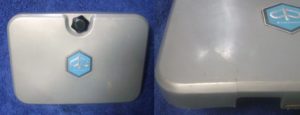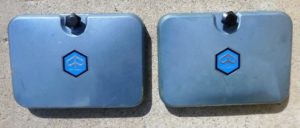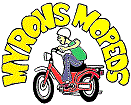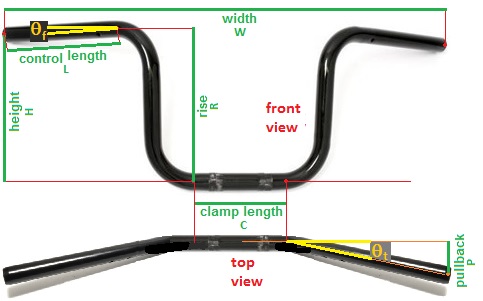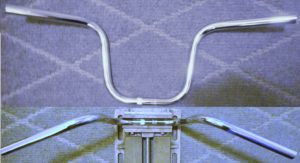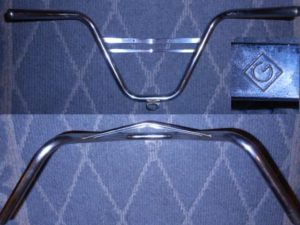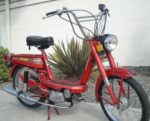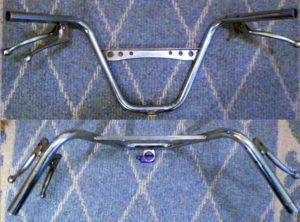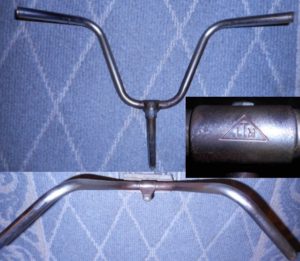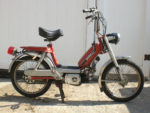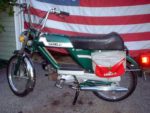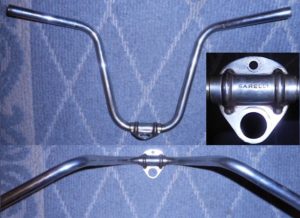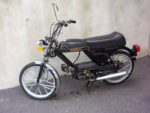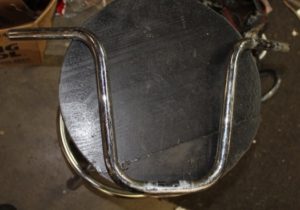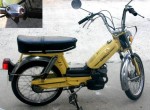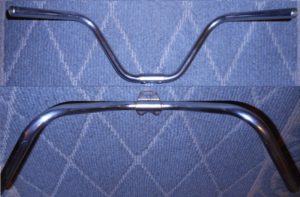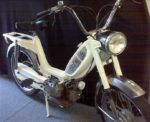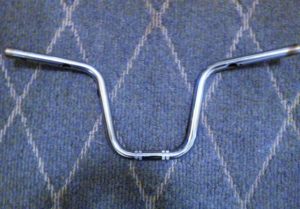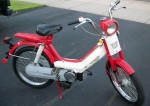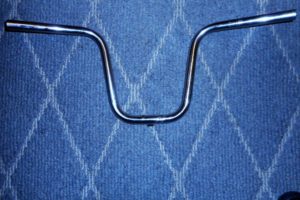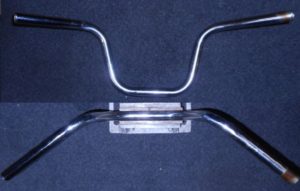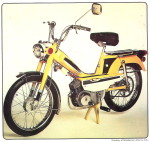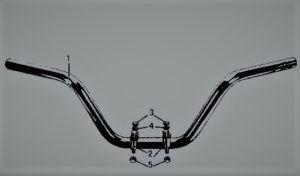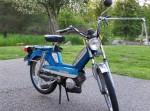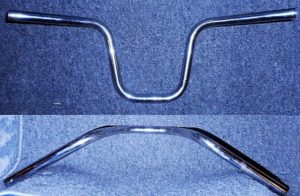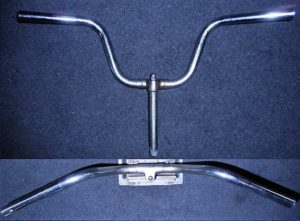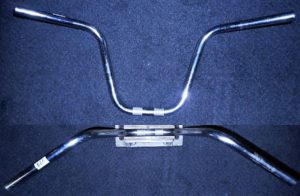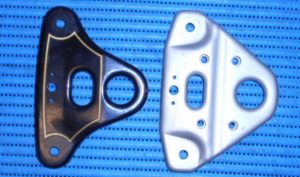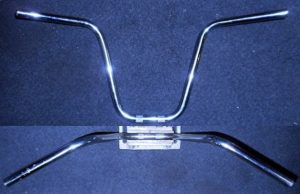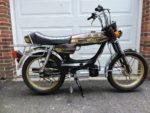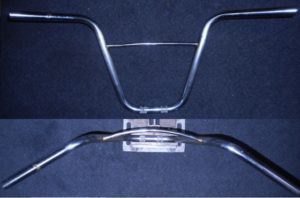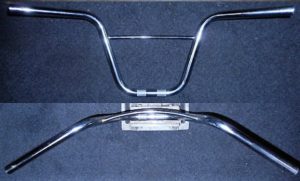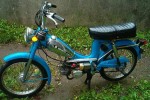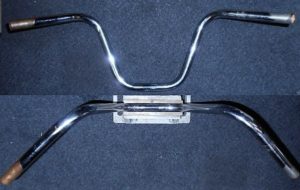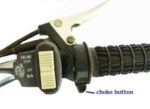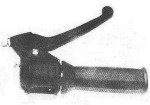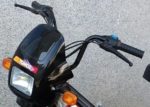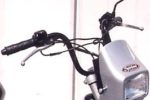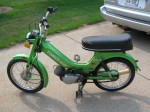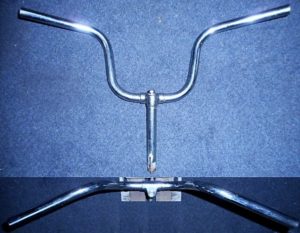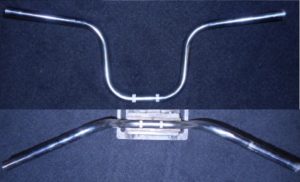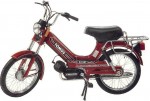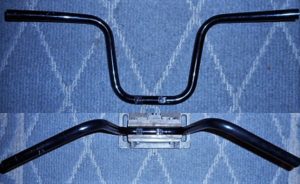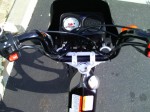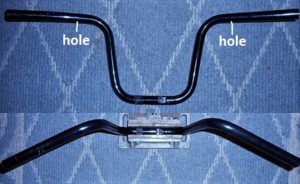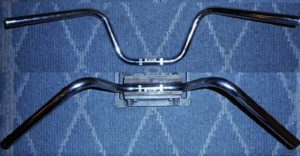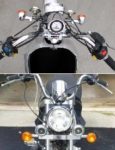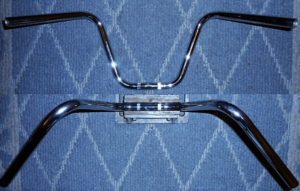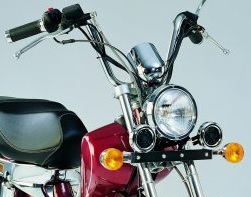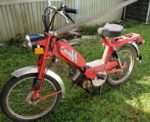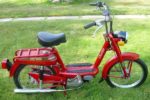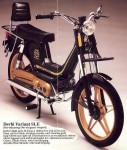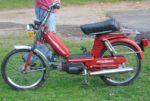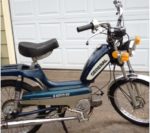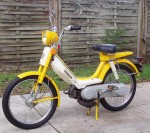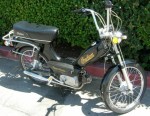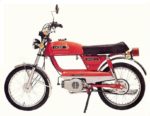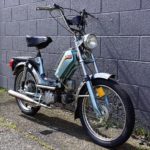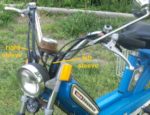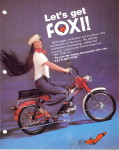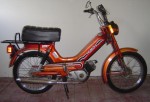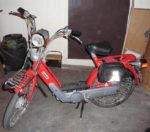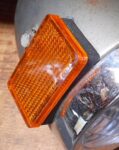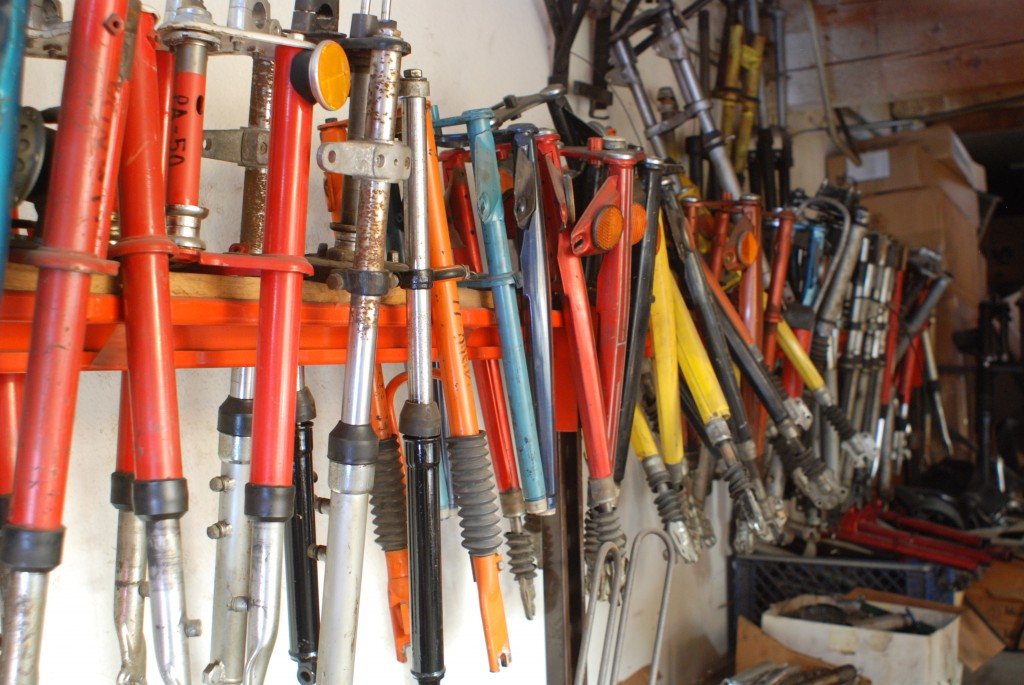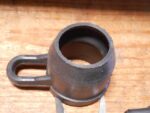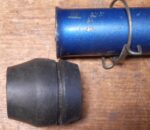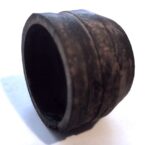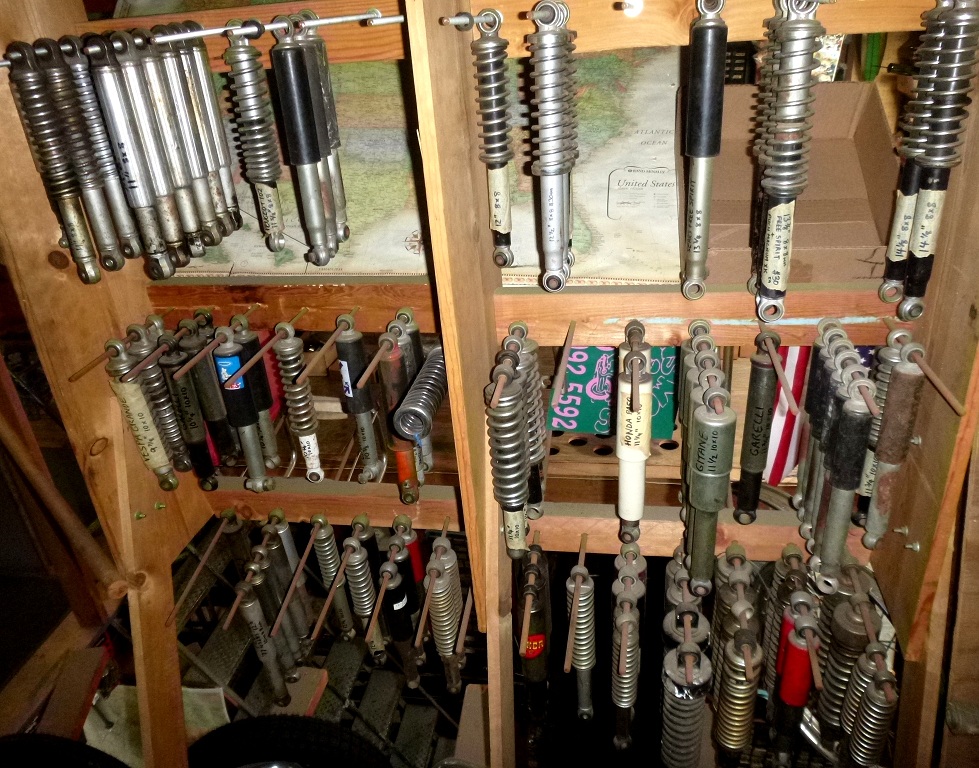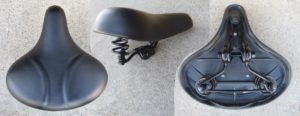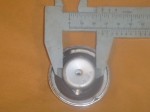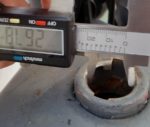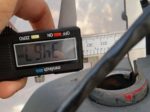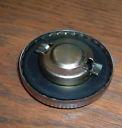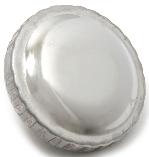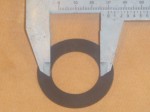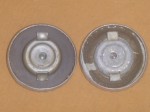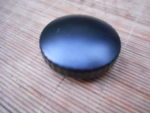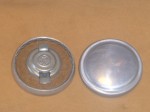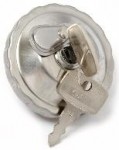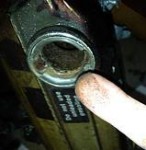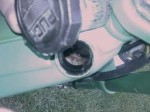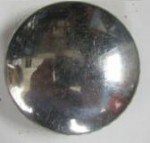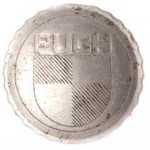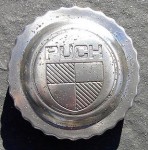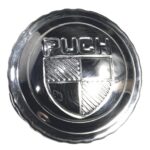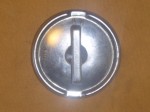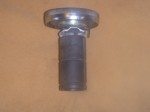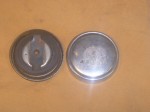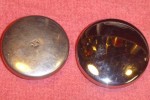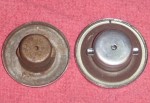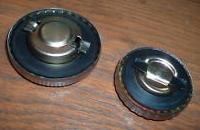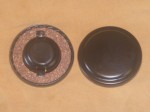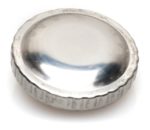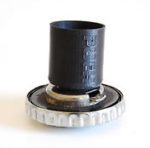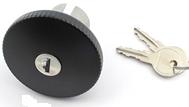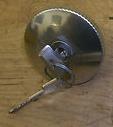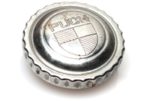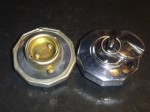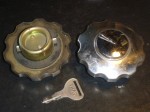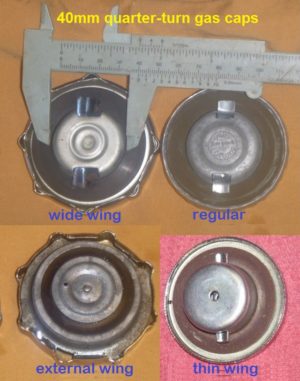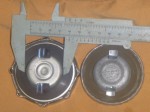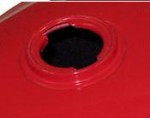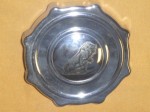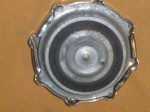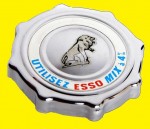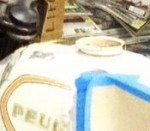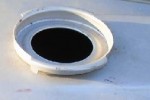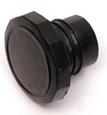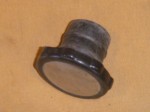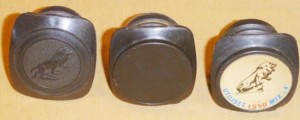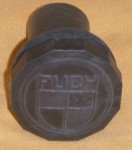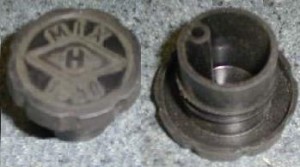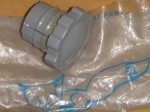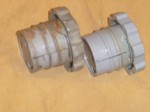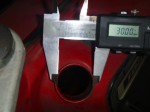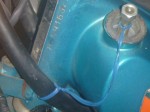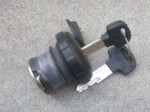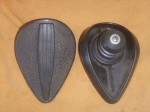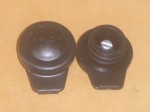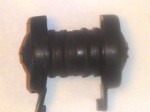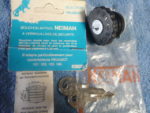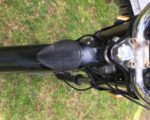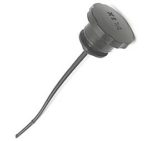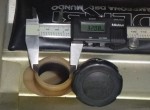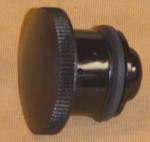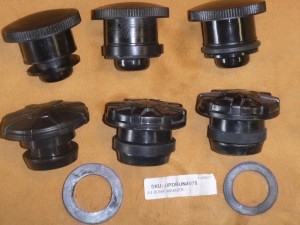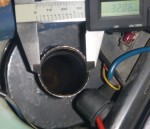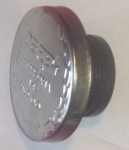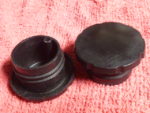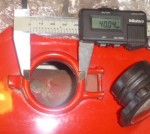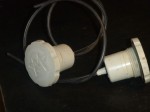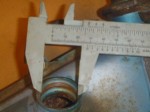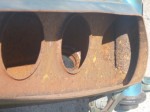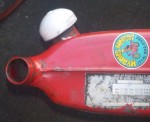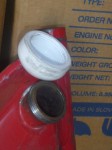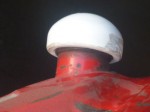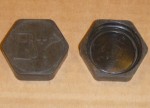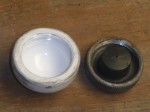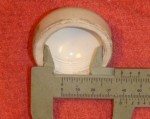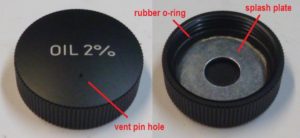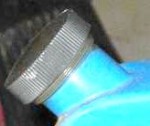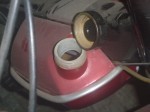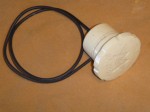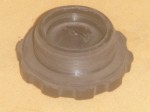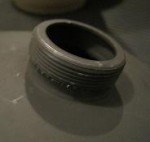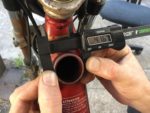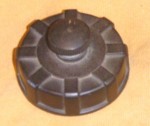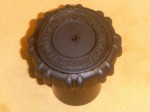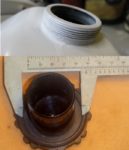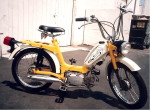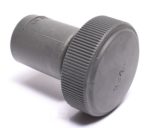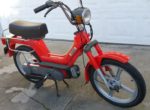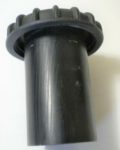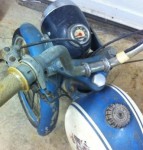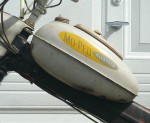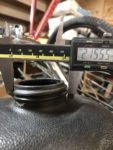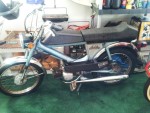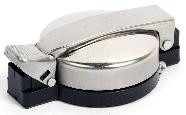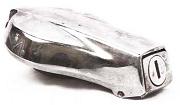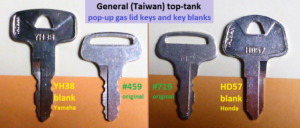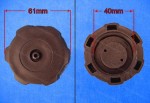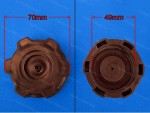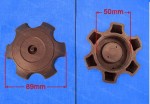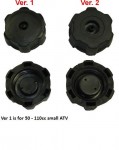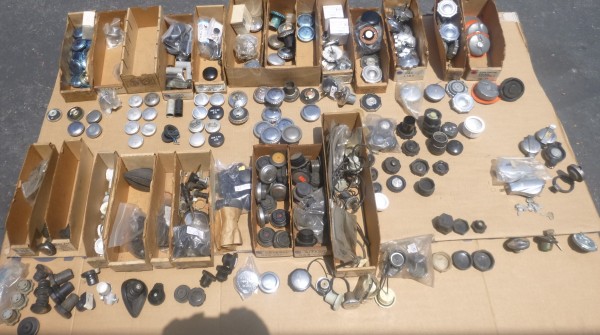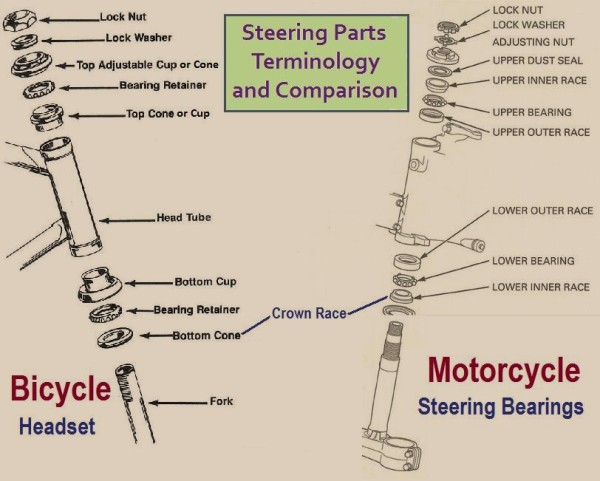
Bicycles are external, motorcycles are internal.
Welcome. Steering bearings on most bicycles are external type, where the bearings lie outside the frame head tube (which is “not stepped”). Steering bearings on most motorcycles are internal type, where the bearings lie inside the frame head tube (which is “stepped”). All mopeds have the bicycle type steering bearings, except Derbi, which has motorcycle type.
Balls Up or Balls Down is the famous question faced when installing retainer (caged) ball bearings. The lower bearing always faces balls down, but the top bearing is sometimes facing up, and sometimes facing down. When it is installed wrong the cage gets crushed. The answer is: the balls always face the “cone” and not the “cup”, regardless of “up” or “down”. Sometimes the upper frame race is a “cone”, sometimes it is a “cup”.
Any bearing, when pushed together lightly with your fingers, should feel like the balls are rolling. Nothing should feel like it’s scraping or sliding. When you see the balls rolling at half the rotation speed, and the feel is solid and smooth like an ice cube on a smooth table, then the bearing is correct and good.
Caged Balls or Loose Balls can be interchanged. The cage/retainer is a convenience, that keeps the balls from falling out during installation. If the retainers are the wrong size, or bent, but the balls are correct, the balls can be popped out, and installed using grease to hold them. When the cage is eliminated, almost twice as many balls are required, enough to fill the circle with a half to one ball gap. This has another big benefit on worn out races that have dents where each ball was at. When the number of balls changes, say from 14 to 26, the dents do not line up anymore. So it’s almost like having a new race.
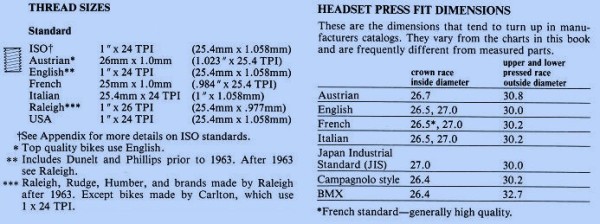
Bicycle headset threads and dimensions, from Sutherlands Handbook
Slight Differences in steering threads have frustrated many bicycle and moped mechanics trying to substitute steering parts from one machine to another. At right is a chart of bicycle headset threads and sizes. Basically the whole world uses ISO threads, one inch with 24 threads per inch (25.4 x 1.06), except France (25.0 x 1.00), Austria (26.0 x 1.00), Raleigh (25.4 x 1.02), and motorcycles (24.0 x 1.00). None of these thread sizes interchange. They either won’t screw on, or they will screw on loosely, and later slip around and “strip”.
Slight Differences in “30mm” frame cups, from 30.0 to 30.2 millimeters, turn out to not matter, ordinarily. Only when the fit is already too loose on a 30.2, or too tight on a 30.0, would it matter.
30.0 replacing 30.2: Take a moped frame that has 30.2 cups and pound one cup out with a hammer and punch, alternating sides. Then take a 30.0 cup and hammer it in. You will only have to strike it about half as hard, because it has a looser press fit. It will hammer out easier.
30.2 replacing 30.0: Take a moped frame that has 30.0 cups and pound one cup out with a hammer and punch, alternating sides. Then take a 30.2 cup and hammer it in. You will have to strike it about twice as hard, because it has a tighter press fit. It will hammer out less easy.
There is much confusion about what is 30mm, the cup outer, or the frame inner. A frame for 30.0 cups can be 29.7 to 29.9 mm inner diameter (id). A frame for 30.2 cups can be 29.9 to 30.1. Some cups are made in between, 30.1 mm. The cups for sale below are classified as “30.0 cups” if they measure 29.9 to 30.15 mm. They are classified as “30.2 cups” if they measure 30.16 to 30.25 mm.
Slight Differences in “32.5mm” frame cups, from 32.5 to 32.7 millimeters, turn out to not matter, ordinarily. They range from 32.5 to 32.7, with most around 32.6.
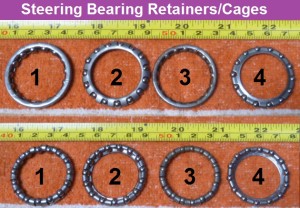
1. #52 2. #65 3. #73 4. “Euro”
Bearing Retainers
1 #52 retainer, 15 – 3/16″ balls 31.5 id $5.00
For traditional American bicycles, AMF, Colombia, etc.
2 #65 retainer, 15 – 3/16″ balls 28.5 id $2.00
For traditional Schwinn bicycles, BMX, and low-end ATB.
3 #73 retainer, 16 – 5/32″ balls 29.0 id $1.50
For traditional ten-speed bicycles, standard bikes, childrens.
A good substitute for the European 14 – 5/32″ ball retainer.
4 “Euro” retainer, 14 – 5/32″ balls 27.0 id $8.00
This is like a #73 retainer with an inner lip for stiffness.
Loose Balls
1 5/32 inch (#5) balls (3.97mm), pack of 26 $2 26 loose 5/32″ balls can replace a “Euro” 14-ball retainer.
For light duty moped and bicycle headsets. 26 loose 5/32″ balls can replace a #73 16-ball retainer.
2 3/16 inch balls (4.76mm), package of 26 $2 22 loose 3/16″ balls can replace a #65 15-ball retainer.
For heavy duty headsets, and some wheels. 22 loose 3/16″ balls can replace 21 loose 5mm balls
3 5 millimeter balls (5.00mm), pack of 21 $5 21 loose 5mm balls can replace 22 loose 3/16″ balls
For Puch Magnum, Sears Free Spirit, and Tomos. More balls, or bigger balls, can carry more weight.
Headsets and Parts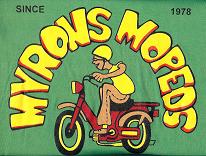
In ascending order of thread size (fork), then cup size (frame).
After years of ignorance and misunderstanding, moped headset items have been identified, measured, verified, and presented below. With these measurements and specifications, it is possible to find correct replacements by measuring their sizes precisely with a calipers or a micrometer, and then matching it with the pictures and or brand names below, hopefully. These things have to be somewhat precise. If something is too tight it might not go on. If it’s too loose, or mismatched, the bike might be difficult to control, or be unpleasant to ride.
24.0 x 1.00 mm thread
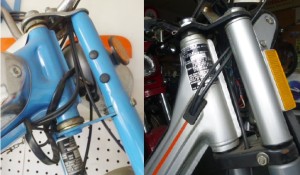
Derbi 24.0 x 1.00 (0.94″- 25.4 tpi), internal
Derbi mopeds have internal steering bearings, like motorcycles have. You can see on the Derbi at the right, the bearings are not visible. But on the Sparta Foxi on the left, the steering bearings are visible above and below the frame head tube. The Sparta has external steering bearings, as do all other mopeds.
Japanese motorcycles usually have this 24×1 thread on the top nut, but further down the steering tube steps up to 25×1 or 26×1 or bigger, where the bearings go.
25.0 x 1.00 mm thread
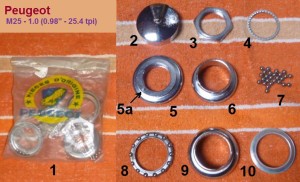
Peugeot headset, 25-1.0 thread, 30.0 cups
Peugeot 25.0 x 1.00 (0.98″- 25.4 tpi), 30.0 cups
1 51974 complete set #2-10 $40
2 48684 top chrome cap, press fit $10-$18
3 51646 lock nut, 5 tall, 32 hex $5-$7
4 56118 lock washer serrated N/A
5 91783 adjustable cone chrome $4-$6
5a This little “nub”, from Peugeot bicycles, must be ground off.
5a It goes into a ring of holes, a special “holey” washer, not #4.
6 91778 upper frame cup chrome 30.0 od $8
7 91502a upper balls, 26 – 5/32″ 3.97mm $2 or use #73
8 91502 lower “Euro” retainer 14-5/32″ $8 or use #73
9 46840 lower frame cup chrome 30.0 od $8
10 14512 lower cone (crown race) 26.7 id $5-$8
30.0 cups will replace 30.2 ones. They just press in easier.
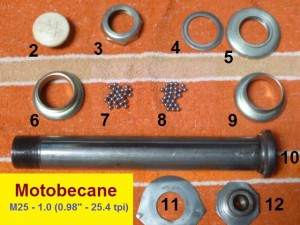
Motobecane headset, 25-1.0 thread, 30.2 cups
Motobecane 25.0 x 1.00 (0.98″- 25.4 tpi), 30.2 cups
1 23312 partial set #3,5,6,7,8,9 N/A
2 15528 top plastic cap, press fit $10–$18
3 15526 lock nut, 32 octagonal $6
4 00000 plain washer 25x35x1 $2
5 23016a adjustable cone, zinc plated $8-$12
6 23016b upper frame cup, zinc 30.2 od $7
7 00005 upper balls, 26 – 5/32″ $2/26 or use #73
8 00005 lower balls, 26 – 5/32″ $2/26 or use #73
9 14208 lower frame cup, zinc 30.2 od $7
10 19859 steering tube with lower race N/A
11 14606 lock plate/washer $4
12 14605 pivot bolt M20-1.0, 32 oct $15
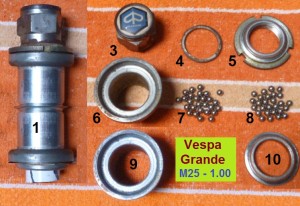
Vespa Grande set, 25- 1.0 thread, 33.0 cups
Vespa Grande 25.0 x 1.00 (0.98″- 25.4 tpi), 33.0 cups
Vespa Grande headset is unique, heavy duty, French thread.
3 G68856 chrome cap nut, 32 hex, 25×1 $12-18
3a 000000 Piaggio emblem pressed-in N/A
4 306912 thin washer for nut $3
5 G21316 adjustable cone, 25×1, notched $15
6 G22937 upper frame cup, zinc 33.0 od $7.00
7 G21317 upper balls, 27 – 5/32″ 3.97mm $2/27
8 G21317 lower balls, 27 – 5/32″ 3.97mm $2/27
9 G22937 lower frame cup, zinc 33.0 od $7.00
10 G21315 lower cone (crown race) 25.6 id $7.00
The Grande crown race is only 25.6 id, and the fork is 25.7.
25.4 x 1.06 mm thread
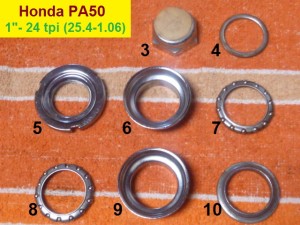
Honda PA50 headset, 1″-24 thread, 30.0 cups
Honda PA50 25.4 x 1.06 (1.00″- 24.0 tpi), 30.0 cups
The Honda PA50 Hobbit (Camino) is made in Belgium.
It is mostly European in design and components.
3 00000000 chrome cap nut, original N/A use bicycle
4 00000000 washer 26x32x1.5 $3
5 00000000 adjustable cone chrome N/A use bicycle
6+9 00000000 frame cup chrome, each 30.0 od $5 2.0 thin wall
7+8 00000000 orig. retainer 14-5/32″ each $8
7+8 JB-1909 #73 retainer, 16-5/32″ each $1.50
10 00000000 lower cone (crown race) 25.7 id N/A
10
This is the original crown race size. It was loose on the fork.
Three samples of Honda PA50 original forks were like this.
The fork steering tube is a straight 25.4mm all the way down.
So there needs to be a 0.15mm hard steel strap under the race.
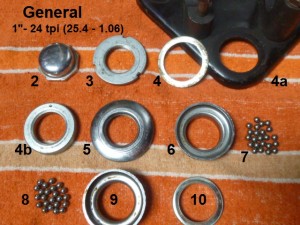
General headset, 1″-24 thread, 30.0 cups
General 25.4 x 1.06 (1.00″- 24.0 tpi), 30.0 cups
2 1150-5860 chrome cap nut, original $20 use bicycle
3 1150-5895 stepped notched nut, 31.8 lip $15
The bottom side of nut #3 has a lip that fits inside #4a.
That’s why the holes in #4 and #4a are big, 32 not 26.
This lip carries the side loads through the nut threads,
instead of the fork top pressing on the threads directly.
1960’s small Honda motorcycles had this design.
4 1150-5894 plain washer 32x44x0.5 $5
4a 3150-5885 fork top plate, 31.8 hole N/A
4b 1150-5886 spacer tube 26x41x8 $7
5 1150-5893 adjustable cone chrome $15
6 1150-5892 upper frame cup chrome 30.0 od $15
7+8 1150-5890 loose balls, 23 – 3/16″ 4.76mm $2/26
9 1150-5891 lower frame cup chrome 30.0 od $15
10 JB-2742 lower cone (crown race) 27.0 id $7
Asian mopeds use the Japan Industry Standard (JIS). General, Lazer, Grycner, Clinton, Jui Li, AMS, Tas, Tym, etc.
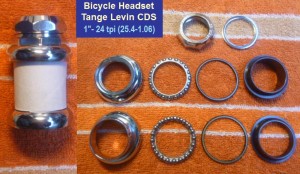
Tange Levin CDS sealed precision headset
Bicycle (JIS) 25.4 x 1.06 (1.00″- 24.0 tpi), 30.0 cups
JB-35496 EC30/27 Tange Levin sealed headset $30
0000000 upper frame cone black 30.0 od N/A
0000000 lower frame cup chrome 30.0 od N/A
0000000 lower cone (crown race) 27.0 id N/A
JIS stands for Japan Industry Standards.
JIS crown races are 27.0 id, for a 27.1 fork.
JIS frame cups are 30.0, for a 29.9 frame.
Bicycle (ISO) 25.4 x 1.06 (1.00″- 24.0 tpi), 30.2 cups
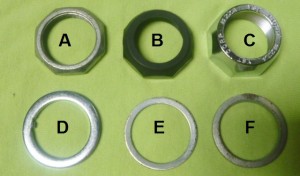 JB-35495 EC30/26 Tange Levin sealed headset $30
JB-35495 EC30/26 Tange Levin sealed headset $30
0000000 upper frame cone black 30.2 od N/A
0000000 lower frame cup chrome 30.2 od N/A
0000000 lower cone (crown race) 26.35 id N/A
ISO stands for International Standards Organization.
ISO cups are 30.2 mm o.d, for a 30.1 mm i.d frame.
ISO crown races are 26.4 id, for a fork crown 26.5 od.
Nuts and Washers:
A 0000000 thin lock nut, for spacing, 1″-24, oct $2.00
B JB-35705 Origin8 black open top nut, 1″-24, oct $2.00
C JB-3510 Wald 220 chrome open nut 1″-24, oct $5.00
D 0000000 keyed thick washer 26x34x3 $1.00
E 0000000 plain thin washer 26x32x1.5 $1.50
F 0000000 plain thick washer 26x33x2.5 $2.00
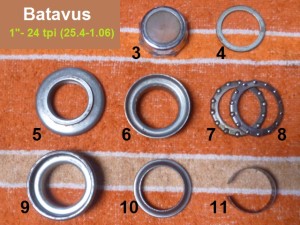
Batavus headset, 1″-24 thread, 30.1 cups
Batavus 25.4 x 1.06 (1.00″- 24.0 tpi), 30.1 cups
Batavus mopeds are made in Holland.
1 47.043.00 partial headset #3-10 N/A
2 46.306.00 plastic plug for nut N/A
3 02.059.00 chrome open nut, original $5-10 use bicycle
4 06.055.00 washer 26x34x1.5 $3
5 47.043.04 adjustable cone chrome N/A use bicycle
6 47.043.03 upper frame cup, zinc 30.1 od N/A use Peugeot
7+8 47.096.00 orig. retainer 14-5/32″ each $8
7+8 JB-1909 #73 retainer, 16-5/32″ each $1.50
9 47.043.02 lower frame cup, zinc 30.1 od N/A use Peugeot
10 47.043.01 fork cone (crown race) 26.5 id $12 use bicycle
11 46.117.00 spring strap/sleeve 1.0/0.35 N/A
The fork steering tube is a straight 25.5mm all the way down.
The strap crushes to 0.5 mm, so it adds up, 26.5 = 25.5 + 2*0.5.
The ideal spring strap for Batavus would be 0.5mm.
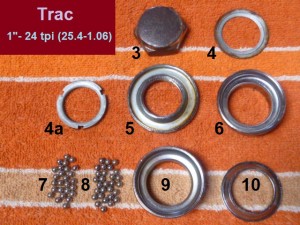
Trac headset, 1″-24, 30.0 and 30.2 cups
Trac 25.4 x 1.06 (1.00″- 24.0 tpi), 30.2 cups
Trac mopeds are made in Korea by Kia and Dae Lim (DMC).
This example is for the early Tracs 1982-85 with M56 engines.
3 90305-M56-8900 chrome cap nut, orig. hex N/A use bicycle
4 90503-M56-8900 washer 26 x 37 x 1 $3
4a 90304-M56-8900 notched thin nut N/A use octag.
5 53211-M56-8900 adjustable cone chrome N/A use bicycle
6 50301-M56-8900 upper cup chrome 30.2 od N/A
7 96211-05000 upper balls, 26- 5/32″ #5 $2/26 or use #73
8 96211-05000 lower balls, 26- 5/32″ #5 $2/26 or use #73
9 50302-M56-8900 lower cup chrome 30.0 od N/A
10 53212-M56-8900 cone (crown race) 25.5 id N/A
This is the original crown race size, but it was loose on the fork.
The fork steering tube is a straight 25.4 mm all the way down.
The looseness had caused a 25.3 mm wear groove on the tube.
To be tight it needs a spring strap and a bigger race, like Batavus.
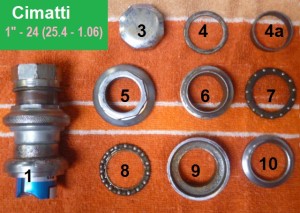
Cimatti headset, 1″-24 thread, 30.2 cups
Cimatti 25.4 x 1.06 (1.00″- 24.0 tpi), 30.2 cups
Cimatti’s are Italian, and use Italian headset standards.
Cups are 30.2, for a 30.1 frame. Same as bicycle.
3 18-00-51 chrome cap nut, 32 octagon $20
4 18-01-18 plain washer, 26x30x1.5 $3
4a xx-xx-xx spacer tube, 26x29x9 N/A
5 12-00-65 adjustable cup chrome $12
6 12-00-62 upper frame cone, zinc 30.2 od $8
7+8 10-00-39 orig. retainer 14-5/32″ each $8
7+8 JB-1909 #73 retainer, 16-5/32″ each $1.50
9 12-00-63 lower frame cup chrome 30.2 od $20
10 12-00-64 fork cone (crown race) 26.5 id $12
11
Italian crown race is 26.5 id, for a fork crown 26.6 od.
ISO (International Standards Org.) threads are 1″- 24 tpi.
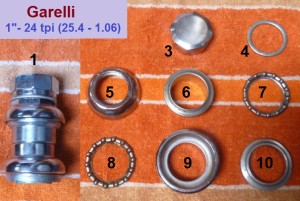
Garelli headset, 1″-24 thread, 30.2 cups
Garelli 25.4 x 1.06 (1.00″- 24.0 tpi), 30.2 cups
Garelli’s are Italian, and use Italian headset standards.
1 507607.2100 complete original set #3-10 $65
1a 000.0000 set with chrome hexagonal nut $45
2 206.3067 chrome open nut, 32 octagonal $6
3 000.3086 chrome cap nut, 32 octagonal $20
4 000.3085 plain washer, 26x30x1.5 $3
5 207.3078 adjustable cup chrome $12
6 000.3062 upper frame cone zinc 30.2 od $8
7+8 10-00-39 orig. retainer 14-5/32″ each $8
7+8 JB-1909 #73 retainer, 16-5/32″ each $1.50
9 201.3064 lower frame cup chrome 30.2 od $20
10 000.3065 lower cone (crown race) 26.5 id $12
One German-made moped, Kynast, uses this headset,
because Kynast (Flying Dutchman) has an Italian fork.
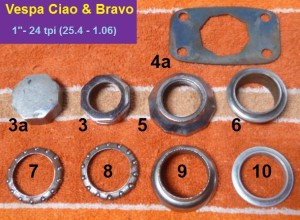
Vespa Ciao or Bravo, 1″- 24 tpi, 30.2 cups
Vespa Ciao/Bravo 25.4 x 1.06 (1″- 24 tpi), 30.2 cups
Vespa mopeds are made in Italy by Piaggio.
1 135977 partial original set #5-10 $25
3a 145608 chrome cap nut, 32 oct (Bravo) $20
3 137609 chrome open nut, 32 oct (Ciao) $18 use bicycle
4a 145607 locking plate, 32 octagon (Bravo) N/A
5 136258 adjustable cup chrome decagon $12
6 123315 upper frame cone zinc 30.2 od $8
7+8 10-00-39 orig. retainer 14-5/32″ each $8
7+8 JB-1909 #73 retainer, 16-5/32″ each $1.50
9 123316 lower frame cup chrome 30.2 od $12
10 123317 lower cone (crown race) 26.5 id $10
11 Vespa uses Italian headset standards, 26.5 and 30.2.
12
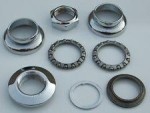
Schwinn headset
1″- 24, 32.5 cups
1960’s re-chromed
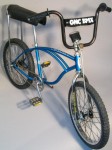
1968 Schwinn
BMX equipped
Bicycle, Schwinn 25.4 x 1.06 (1″- 24 tpi), 32.5 cups
In the 50’s – 60’s USA this was a Schwinn-only head set size.In the late 1960’s BMX (bicycle moto cross) began. The first BMX bikes were 20″ kids bikes with off road tires, MX handlebars and seat. The Schwinn Stingray was preferred, because of it’s heavy duty construction and high quality. In the 70’s BMX equipment became Schwinn-compatible, including frames with 32.5 mm headset cups. BMX became very popular, as did the headset. In the 80’s it became the mountain bike (ATB) standard. In the 1990’s bigger 1-1/8″ steering tubes came out on high-end ATB’s, with 34.0 frame cups. Soon 34mm frames became the new ATB standard. Then bigger 1-1/4″ steering tubes and 37mm frames followed. Now this historic headset is almost obsolete.
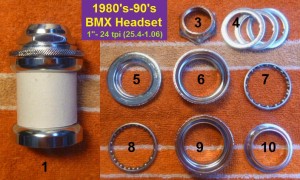
BMX Headset, 1″-24 thread, 32.5 cups
This is a 1980’s-90’s BMX or ATB headset, 32.5 cups.
The cups fit Puch Magnum, Tomos and Sears Free Spirit.
1 JB-35334-0 EC32/26 Sunlite chrome headset $10
3 JB-35334-3 Sunlite chrome open nut, 32 hex $5
4 JB-35334-4 keyed washer 26x34x1.5 $1
5 JB-35334-5 adjustable cone chrome $3
6 JB-35334-6 upper frame cup chrome 32.5 od $4
7 JB-35334-7 special retainer, 16-5/32″ each $3
8 JB-35334-7 special retainer, 16-5/32″ each $3
For 50 years these had #65 retainers, with 3/16″ balls.
9 JB-35334-9 lower frame cup chrome 32.5 od $6
10 JB-35334-1 lower cone (crown race) 26.4 id $8
The fit, roundness and finish are surprisingly good.
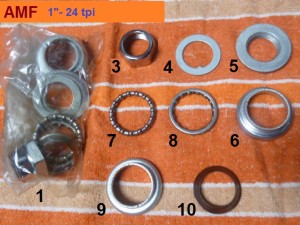
AMF headset, 1″-24 thread, 33.6 cups
Bicycle, American 25.4 x 1.06 (1″- 24.0 tpi), 33.6 cups
1 MP-0014 AMF original headset #3-10 $40
1a JB-3512 Wald 4080 headset 3a-10 below $15
3 MP-0014-1 chrome AMF open nut, hex $18
3a JB-3510 Wald #220 chrome nut, 32 oct $5
4 MP-0014-1a tab/lock washer $2
4a JB-3503 1 inch keyed washer $1
5 MP-0014-2 adjustable cone, zinc $8
6+9 MP-0014-4 frame cup zinc, each 33.6 od $15
6a+9a JB-3513 Wald #410 cup, each 33/34 od $6
7+8 MP-0014-3 #52 retainer 15 – 3/16″, each $5
10 MP-0014-5 lower cone (crown race) 25.7 id $7
10a JB-35345 lower cone (crown race) 26.4 id $8
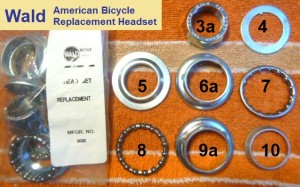
Wald headset, 1″-24, 32.9/34.3 cups
This standard is on AMF, Colombia mopeds and bicycles.
Also traditional American bicycles, Murray, Huffy, etc.
Wald 4080 headset is for traditional or vintage American.
The Wald 410 replacement frame cups have 3 “bumps”.
The diameter is 32.9 mm, but 34.3 mm at the bumps.
Grind them down to fit any frame from 32.8 to 34.2 mm.
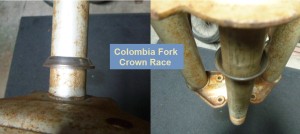
American Crown Race: Unlike other fork crowns that have a small step at the base of the steering tube, American type bicycles have a smooth flare. The race #10 only touches at the top of the flare, and at the bottom floor of the fork. You can see in the right photo the crown race is cone shaped inside. All other crown races are cylindrical shaped inside.
If an American type conical crown race is not available, then a 26.4 mm id standard crown race will substitute (at least it did on this fork), thanks to the bottom having enough straight section that is 26.5 mm outer diameter. It sounds crazy that a 26.4 race will substitute for a 25.5 one. That is why this explanation and pictures are needed here.
26.0 x 1.00 mm thread
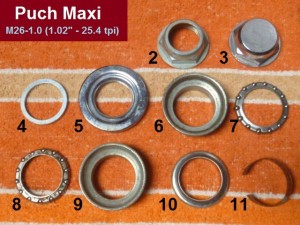
Puch Maxi set, 26 -1.0 thread, 30.8 cups
Puch Maxi 26.0 x 1.00 (1.02″- 25.4 tpi), 30.8 cups
The Puch Maxi headset is the same as Sachs (Hercules).
1 0000000000 partial headset #5-10 see treatland.tv
2 3491300181 chrome open nut $7-$15
3 3491305181 chrome cap nut $8-$20
4 0009013935 plain washer 26x32x2 $3
5 6001330071 adjustable cone chrome $3-$5
6+9 6002330051 frame cup, zinc each 30.8 od N/A 2.0 thin wall
7+8 0003298 orig. retainer 14-5/32″ each $8
7+8 JB-1909 #73 retainer, 16-5/32″ each $1.50
10 6002330061 lower cone (crown race) 26.7 id $5-$8
11 3491300151 spring strap/sleeve 1.0/0.35 mm N/A
Installed, the sleeve becomes 0.35 mm. So 26.7 = 26.0 + 2*0.35
These sizes are the traditional Austrian bicycle headset standard.
The 1984-86 Puch Cobra, was a “Magnum”, but it had this Maxi headset.
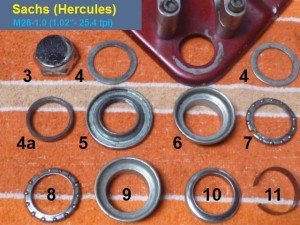
Sachs headset, 26-1.0 thread, 30.8 cups
Sachs/Hercules 26.0 x 1.00 (1.02″- 25.4 tpi), 30.8 cups
The Sachs headset is the same as a Puch Maxi headset.
1 5041009701 partial headset #5-10 see treatland.tv
2 9271013516 chrome open nut N/A use Puch Maxi
3 9271013519 chrome cap nut N/A use Puch Maxi
4 9279920817 plain washer 27x37x1.25 N/A
4a 9279919606 spacer ring 27x32x6 N/A
5 000000000 adjustable cone chrome N/A use Puch Maxi
6+9 00000000 frame cup, zinc each 30.8 od N/A 2.0 thin wall
7+8 00000000 orig. retainer 14-5/32″ each $8
7+8 JB-1909 #73 retainer, 16-5/32″ each $1.50
10 000000000 lower cone (crown race) 26.7 id $5-$8
11 9219769501 spring strap/sleeve 1.0/0.35 thick N/A
Installed, the sleeve becomes 0.35 mm. So 26.7 = 26.0 + 2*0.35
These sizes are the traditional Austrian bicycle headset standard.
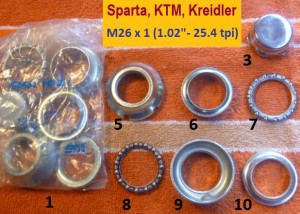
Sparta, KTM, 26-1.0 thread, 32.0 cups
Sparta/KTM 26.0 x 1.00 (1.02″- 25.4 tpi), 32.0 cups
1 00000000 complete headset #3-10 $35
2 335.01.01 chrome cap nut (Kreidler & KTM) $10-$18
3 00000000 chrome cap-lug nut (for Sparta) $10-$20
This nut bottom is cone shaped, for centering, like a lug nut.
4 235.01.10 plain washer (for Kreidler & KTM) $2
5 00000000 adjustable cup, bright zinc $5-$8
6 235.01.02 adjustable cup chrome (Kreidler) $15
6 00000000 upper frame cone, zinc 32.0 od $5-$8
7+8 JB-1908 #65 retainer, 15 – 3/16″ each $2
7+8 00.69.27 22 – 3/16″ balls (Kreidler) each $2/26
9 00000000 lower frame cup zinc 32.0 od $5-$8
10 00000000 lower cone (crown race) 26.7 id $5-$8
New crown races range from 26.65 to 26.74 mm id.
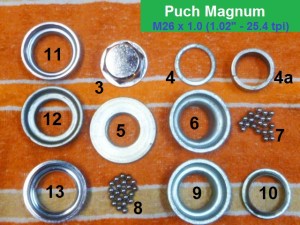
Puch Magnum set, 26-1.0 thread, 32.6 cups
Puch Magnum 26.0 x 1.00 (1.02″- 25.4 tpi), 32.6 cups
Puch Magnum MkII, Sears Free Spirit 8084, 8085, 8086 silver:
3a 3211308181 chrome cap nut (zinc on Sears) N/A
4b 3211308191 washer 29x35x.75 N/A above plate
4a 3211308511 spacer 26x32x13.5 $8 below plate
Magnum XK, Sears Free Spirit 8080 blue, 8081,8082,8083 red:
3 3491305181 chrome cap nut $8-$20
4 9013935 washer 26x32x2.5 $3 below plate
All Puch Magnums (except Cobra) and Sears Free Spirits:
5 3211307081 adjustable cone zinc 51 od $15-$20
6+9 25221 frame cup, zinc, each 32.6 od $25 3.3 thick wall
7+8 25226 loose balls 5mm qty 21 each $5/21 or use 3/16
10 25220 lower cone (crown race) 26.7 id $5-$8
11 00000 early Schwinn cup, chrome 32.5 $12 2.0 thin wall
12 02016 Sears Free Spirit cup, zinc 32.6 $15 2.8 thick wall
13 00000 Schwinn/BMX cup, chrome 32.7 $20 2.6 thick wall
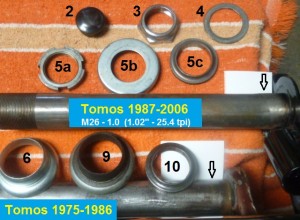
Tomos A3 and A35, 26-1.0 thread, 32.6 cups
Tomos 1975-2006 26.0 x 1.0 (1.02″-25.4 tpi) 32.6 cups
Tomos made Puchs, under license, from 1955 to 1974.
That is why the steering parts also fit Puch Magnum.
3 200718 chrome open nut 32 hex $8-$12
3a 219349 chrome cap nut 32 hex $8-$15
4 206701 plain washer 26x36x1.5 $3
5a 200717 notched adjustment nut $5
5b 200715 dust shield 26x47x9mm $5
5c 200714 upper cone, no threads 26.0 id $8
6 200558 upper frame cup, zinc 32.6 od $15 2.6 thick wall
7 044535 upper balls 5mm qty 21 $5
8 044535 lower balls 5mm qty 21 $5
9 200471 lower frame cup, zinc 32.6 od $20 2.6 thick wall
10 200714 lower cone (crown race) 26.0 id $8
11
The 1987-06 Tomos fork has M26-1.0 rolled threads 25.8 od, then smooth 25.1 od, flaring to 26.1 at arrow.
The 1975-86 Tomos fork has M26-1.0 cut threads 25.8 od, then smooth 26.0 od, flaring to 26.1 at arrow.
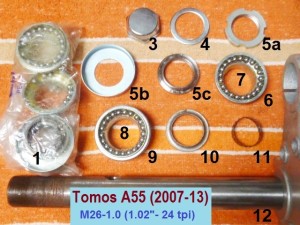
Tomos A55 headset, 26-1.0 thread, 32.5 cups
Tomos 2007-2013 26.0 x 1.0 (1.02″-25.4 tpi) 32.5 cups
1 230741 partial headset #4-11 $40
The 2007-12 Parts Catalogs only have the older fork items.
So the 07-on EBR fork items, 10 and 11, are not available.
3 219349 chrome cap nut 32 hex $8-$15
4 222848 chrome washer 26x36x2 $3
5a 200717 notched adjustment nut $5
5b 200715 dust shield 26x47x9mm $5
5c 200714 upper cone, no threads 26.0 id $8
6 223155 upper frame cup, zinc 32.5 od $15 2.6 thick wall
7 044535 upper balls 5mm qty 21 $5
8 044535 lower balls 5mm qty 21 $5
9 223157 lower frame cup, zinc 32.5 od $18 2.6 thick wall
10 00000 lower cone (crown race) 27.4 id N/A use 26.7-27.0
11 00000 spring strap/sleeve 1.0/0.4 thick $10 for 27.4 race
The strap crushes down from 1.0 to 0.7 when installed.
So 27.4 = 26.0 + 2*0.7. Ideal strap is 0.7mm thick.
The 2007-13 Tomos fork has M26-1.0 cut threads 25.8 od, then smooth 26.0 od, with no flare.
Instead of a flare or step, it has a #11 spring strap, the same one that a Puch Maxi has.
28.0 x 1.00 mm thread
Vespa Si 28.0 x 1.00 (1.10″- 25.4 tpi) 41.2 cups
This futuristic early 1980’s moped has a bigger steering tube and bearings.
This size was also for an old French tandem, according to http://sheldonbrown.com/cribsheet-headsets.html
3 212152 chrome cap nut 36 oct $20
4 000000
5 000000
6 000000 upper frame cup, zinc 41.2 od $15 4.0 thick wall
7 000000 upper balls
8 000000 lower balls
9 000000 lower frame cup, zinc 41.2 od N/A 4.0 thick wall
10 000000 lower cone (crown race)
28.6 x 0.98 mm thread
Bicycle (1-1/8″) 28.6 x 0.98 (1.125″- 26 tpi) 34.0 cups
EC34/30. This (1.125″) was the first oversize for 1990’s mountain bikes (ATB), 34.0 cups, 30.0 crown race.
31.8 x 0.98 thread
Bicycle (1-1/4″) 31.8 x 0.98 (1.25″- 26 tpi) 37.0 cups
EC37/33. This (1.25 inch) is the biggest external cup (EC) threaded bicycle headset, 37.0 cups, 33.0 crown race.
 Stewart Warner
Stewart Warner
